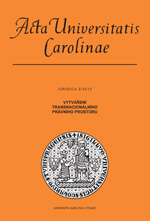Státní suverenita a integrace ve vývoji Evropské unie
State Sovereignty and Integration in the Development of the European Union
Author(s): Luboš TichýSubject(s): Law, Constitution, Jurisprudence
Published by: Univerzita Karlova v Praze, Nakladatelství Karolinum
Keywords: sovereignty; quantification and measurement; weakening; competence; member state; delegation; European Union; integration
Summary/Abstract: 1. The first purpose of this contribution is thus an attempt at the delineation of this term from the viewpoint of legal dogma, taking into consideration its functions. The second purpose is to find out what objective this legal-political formation is serving. If we define sovereignty as the totality of a number of certain competencies, then we necessarily have to ask ourselves how many of these competencies a state or a member state of the EU needs in each stage of its development. The third purpose of this contribution is the verification and the analysis of the sovereignty of a member state in the context of the integration process of the EU . Finally we will answer a key question regarding the mutual relationship between the sovereignty of the state and integration in the form of a supranational community (the EU ). 2. State sovereignty, as a functional category, describing state power and its exercise, based on laws with limitations, which have been brought on by the development during approximately the last fifty years (supranational delegation, limitations introduced by human rights) is still an inevitable phenomenon, with which the current reality cannot dispense in spite of the “privatization” of law or state. Regardless of whether we use, accept, curse, deny, etc. this concept (state sovereignty) or not. 3. State sovereignty has transformed the volume, contents and methods of all of its component parts in a substantial way, especially as far as internal and external sovereignty is concerned. It is obvious that authority, powers and competencies of the state have significantly decreased. However, its contents have changed as well. Many areas have been privatized; this has reduced the activity of the state namely in the sphere of legislative and executive powers, for the responsibility of the state rests only in the judicial power. A radical reform has been carried out concerning the methods of the exercise of sovereignty. New ways of collaboration, loyalty and dialogue have been added. 4. A functional understanding of sovereignty presupposes the full existence of identification and acceptance, which are the basis of legitimacy. 5. Competence on one hand delineates or limits the sovereignty of a state towards individuals (citizens) and other subjects (and thus turns the term sovereignty into legal sovereignty of the sovereignty of law), on the other hand is it a part of the division of power. The summary of competencies means the contents of sovereignty. Competence is the basic corner stone of sovereignty and thus the measurement tool for its potency. For this, however, it is necessary to precisely quantify the contents of competence and the manner of its execution. This involves a relatively complicated process of measuring, which is underestimated, as competence as a type of execution of power is being assessed only “statically”. (...)
Journal: Acta Universitatis Carolinae Iuridica
- Issue Year: 58/2012
- Issue No: 2
- Page Range: 9-27
- Page Count: 19
- Language: Czech

